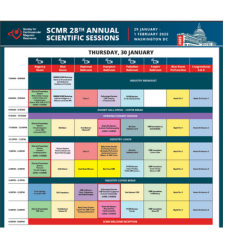Quick Fire Cases
Tissue is the Issue in Myocardial Carcinoid; Thinking Beyond the Valves (QF_TH_043)
- SK
Shaden Khalaf MD, MD
Assistant Professor
MD Anderson Cancer Center at the University of Texas - SK
Shaden Khalaf MD, MD
Assistant Professor
MD Anderson Cancer Center at the University of Texas - NP
Nicolas Palaskas, MD
Assistant Professor
The University of Texas MD Anderson Cancer Center - EK
Efstratios Koutroumpakis MD, MD
Assistant Professor
MD Anderson Cancer Center at the University of Texas - HA
Hyeon-Ju Ryoo Ali MD, MD
Assistant Professor
MD Anderson Cancer Center at the University of Texas - SK
Salil Kumar MD, MD
Assistant Professor
MD Anderson Cancer Center at the University of Texas - CL
Cezar Lliescu MD, MD
Professor
MD Anderson Cancer Center at the University of Texas - AD
Anita Deswal, MD
Chair
The University of Texas MD Anderson Cancer Center - IH
Ihab Hamzeh, MD
Associate Professor
The University of Texas MD Anderson Cancer Center
Presenting Author(s)
Primary Author(s)
Co-Author(s)
In a quaternary cancer center with frequent referral for assessment of carcinoid heart disease. We’ve identified 2 patients with systemic carcinoid syndrome with isolated myocardial metastasis and normal valve function on CMR. Case 1 was performed to better characterize the pulmonic valve due to limited echocardiographic image. Case 2 CMR performed following a normal echocardiogram yet new myocardial radiotracer uptake on surveillance 68 Gallium Dotatate scan.
Diagnostic Techniques and Their Most Important Findings:
Echocardiography remains first line for assessment for carcinoid valve disease affecting 50% of systemic carcinoid patient. Tricuspid and pulmonic valve involvement and later right ventricular dysfunction are a leading cause of morbidity and mortality in this population. Isolated myocardial metastasis can be challenging especially when they arise within trabeculations and muscle bundles as they tend to be homogenous to myocardial tissue on ECHO. On CMR, they are isointense to myocardium T1 weighted imaging but clearly visible on T2 weighted images due to hyperintense signal. More so, they take up LGE on delayed enhancement imaging.
Learning Points from this Case:
Carcinoid myocardial metastasis is an extremely rare on the order of 1 in 100,000 in the general population. The largest case series of 11 patients from Mayo Clinic over 14 year period. These were identified by echo had well circumscribed, homogenous masses with mean size of 2.4 cm. Although a rare condition, these individuals have an increased incidence of conduction abnormalities and require closure cardiac follow-up and maybe candidate for new targeted treatments such as peptide receptor radionuclide therapy. More often time, 68Ga Dotatate scan points to the pathology. We propose that CMR should be the first line scan as they often are missed on echocardiography. The incidence be underestimated as myocardial metastasis are not infrequently noted in patients with advanced carcinoid valve disease on CMR.

